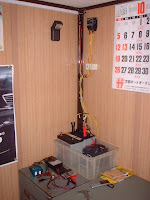This is me, my bikes and my small prefab just after I installed my solar panel. I used the solar panel's batteries to use a 100v electric drill to drill some holes to extract several broken bolts on the bike that I was working at. The batteries were just half charged then and the drill easily drained up it's juices. Good thing that I have a strong engine powered generator to finish the job.
------------------------------
My views about solar energy... I've used this solar panel to charge-up batteries and with years of experience using it, I can say that it is very reliable, easy to maintain and FREE. I have thought of adding more solar panels but since I'm not using a lot of electricity, one is enough for me. When my friends saw this, most of them wanted one for themselves. I am not an enthusiast and never an "eco" freak but I was trained to live off-grid so I just utilize what I need to make stuffs easier for me. Funny I never admit that I'm not into this "eco" thing but I do separate metals from aluminum, bronze, copper, etc and sell them. I also scrap dead batteries. I separate wheels from rims and plastic from metal and get rid of my scrap and garbage properly. I like repairing and using old stuffs and refrain from buying new parts as much as I can. I use wind, and solar energy and I feed my generator with old crappy car fuel boosted-up with acetone plus several of my chemical mayhem :) I think I'm more of a "cheap guy" than an "eco Freak" but when I'm in front of the ladies, "I love ECO" hahaha!
Back to the topic Many times I was asked by friends to help convert their houses to solar power but I often refuse because of the pros and cons.
Pros and cons: Solar panels are expensive and if you will be needing solar energy to power your house, you need lots of solar panels and lots of batteries plus a good DC/AC converter and this too don't come cheap. I helped a friend install solar panels to his cottage house and we ended up using 8 larger solar panels and lots of batteries to support his small room air conditioner and a small refrigerator. The batteries can easily support normal home appliances but not larger ones. The good thing is that solar panels are basically maintenance free. Once the set-up is done, all you have to do is to wipe/clean the panels from time to time to remove dust, leaves, dirt or bird shit and thats it. Batteries do lose their charging power as they age and this is one big factor to think about. Most batteries can last for 3 to 5 years depending on your usage or if you are lucky but some lose their charging power a lot more sooner than expected. It is always best to do a good computation or a good estimate on your long time electric bills to see if it's worth doing.
For me I saved at least 200,000 Yen on my electricity bills for two years since my generator gobbles lots of fuel. I couldn't do a computation against the electrician and the electric bills because it will not be fair to them. I only paid about 10,000 Yen for my second hand solar panel and about 6,000 Yen for the voltage regulator, 2,000 yen for the DC/AC converter, 300 Yen for the alligator clips, 2,000 Yen for the galvanized wire and brackets and the rest are free. Remember that I never paid for batteries since I have a constant supply of car batteries coming from my cars and from car dealer buddies. If you are planning to use solar energy to power your home electricity needs, it will always be best to also have electric service from your local electric company.
I also tried installing several solar panels on my house but I found out that they are too much work for me (changing batteries and hooking-up gadgets). I still want and still need to save electricity even without using my solar panels. What I did is to use energy efficient appliances like eco bulbs/lights, I tried staying away using my desk top computers and use laptops instead. I still use five analog TV sets and one of them is quite huge and eats electricity a lot. There are lots of new eco friendly appliances that can really help you save money. Please think about these new eco friendly appliances when you do your computation...
If you are an enthusiast or you just want to try solar energy to power-up your laptops, shavers, etc, and look cool and eco to your friends, I suggest you get yourself the largest solar panel that you can get your hands on and start from there. Smaller solar panels are just not powerful enough but if you start with a larger panel, you could probably even use this to power your desk top computers and TVs provided you have several good batteries.
Another good technique is to use a step down transformer... I will not discuss this here but this also works :)












